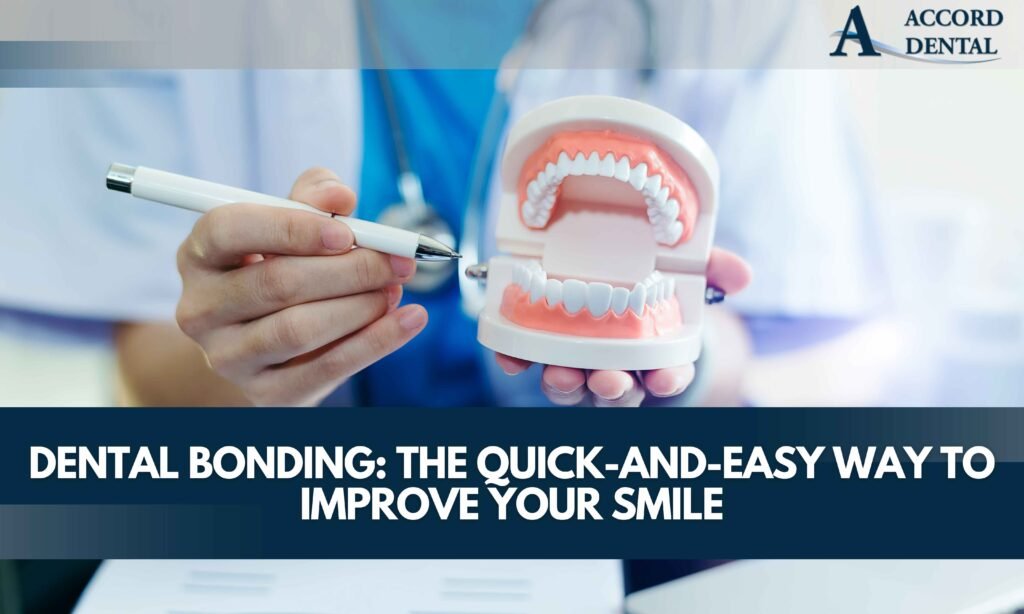When it comes to achieving a stunning smile, dental bonding has emerged as one of the most effective and convenient solutions. This cosmetic dentistry procedure is quick, affordable, and capable of addressing various dental imperfections. Whether you’re dealing with chipped teeth, gaps, discoloration, or uneven shapes, dental bonding offers a versatile way to enhance your smile. In this article, We will tell you what dental bonding is, its benefits, the process, and why it’s a popular choice for smile makeovers.
What Is Dental Bonding?
Dental bonding is a cosmetic dental procedure where a tooth-colored resin material is applied to the teeth, sculpted into the desired shape, and hardened using a special light. This procedure improves the appearance of teeth by addressing aesthetic concerns such as:
- Chipped or cracked teeth
- Discolored teeth
- Gaps between teeth
- Uneven or misshapen teeth
The composite resin used in dental bonding blends seamlessly with your natural teeth, ensuring a natural look that complements your overall smile. It is a non-invasive and straightforward procedure that can transform your smile in just one visit to the dentist.
Why Choose Dental Bonding?
Dental bonding is a popular choice among patients for several reasons. Here are the top benefits that make it stand out:
Quick and Convenient
One of the primary reasons dental bonding is so popular is its speed. Most bonding procedures can be completed in a single dental visit, making it an excellent option for those with busy schedules. Unlike other dental treatments that may take weeks or months, dental bonding offers immediate results.
Affordable Cosmetic Solution
Compared to other cosmetic dental treatments such as veneers or crowns, dental bonding is a cost-effective alternative. It delivers significant aesthetic improvements without breaking the bank, making it accessible to a wider range of patients looking to enhance their smiles.
Minimally Invasive
Dental bonding requires little to no removal of your natural tooth enamel. This makes it a less invasive option compared to veneers or crowns, which often require more preparation and the removal of healthy tooth structure. For those who prefer preserving their natural teeth, bonding is an excellent choice.
Natural Appearance
The composite resin material used in dental bonding is carefully matched to the color of your teeth, ensuring a natural and seamless appearance. It’s virtually impossible to tell where the bonding ends and your natural tooth begins, making it an ideal choice for improving the aesthetics of your smile.
Versatility
From repairing minor chips to closing gaps and correcting discoloration, dental bonding addresses a wide range of dental concerns. This versatility makes it an incredibly popular and effective solution for improving the overall appearance of your teeth.
The Dental Bonding Process: What to Expect
Understanding the dental bonding process can help you feel more confident and prepared for your appointment. Here’s what you can expect during the procedure:
Consultation and Planning
Your journey begins with a consultation with your dentist. During this visit, your dentist will examine your teeth, discuss your goals, and determine if dental bonding is the right solution for you. They will also explain the procedure in detail, ensuring you are comfortable and informed.
Preparation
Unlike other procedures, dental bonding typically requires minimal preparation. In most cases, anesthesia is unnecessary unless the bonding is being used to fill a cavity. Your dentist will clean your teeth and prepare the surface of the tooth to ensure proper adhesion of the bonding material.
Application of Composite Resin
Your dentist will start by selecting a resin color that matches your natural teeth. The surface of the tooth will then be roughened, and a conditioning liquid will be applied to ensure the resin adheres properly. This step is crucial for creating a strong bond between the resin and your tooth.
Sculpting and Shaping
The resin is applied to the tooth and carefully molded into the desired shape. Your dentist will use their expertise to sculpt the material, ensuring it blends seamlessly with the surrounding teeth. This step requires precision and attention to detail to achieve a natural-looking result.
Hardening the Resin
Once the resin is shaped to perfection, a special curing light is used to harden the material. This process bonds the resin securely to the tooth, creating a durable and long-lasting restoration. The hardening process is quick and ensures the material sets properly.
Finishing Touches
Finally, your dentist will polish the bonded tooth to match the natural shine of your teeth. The result is a flawless and natural-looking smile that you can feel confident about. Any final adjustments will be made to ensure your comfort and satisfaction.
How Long Does Dental Bonding Last?
The longevity of dental bonding depends on factors such as oral hygiene, diet, and habits. On average, dental bonding lasts between 5 to 10 years. To extend the life of your bonding, follow these tips:
- Avoid biting on hard objects like ice or pens.
- Limit consumption of staining foods and beverages such as coffee, tea, and red wine.
- Practice good oral hygiene by brushing and flossing daily.
- Visit your dentist regularly for check-ups and cleanings.
Proper care and maintenance are essential for ensuring your bonding remains in excellent condition over time.
Is Dental Bonding Right for You?
Dental bonding is an excellent solution for many people, but it’s not suitable for every case. Your dentist may recommend bonding if you:
- Have minor chips, cracks, or discoloration.
- Want to close small gaps between teeth.
- Are looking for a quick and affordable cosmetic fix.
However, if you have significant structural damage or require a more durable solution, your dentist may suggest veneers or crowns as an alternative. It’s important to discuss your options with your dentist to determine the best approach for your individual needs.
Dental Bonding vs. Veneers: Which Is Better?
Both dental bonding and veneers are popular cosmetic dentistry options, but they serve different purposes and have distinct advantages. Here’s how they compare:
Dental Bonding
- Cost: More affordable than veneers.
- Procedure Time: Completed in one visit.
- Durability: Lasts 5-10 years with proper care.
- Best For: Minor cosmetic imperfections and quick fixes.
Veneers
- Cost: More expensive than bonding.
- Procedure Time: Requires multiple visits.
- Durability: Lasts 10-15 years or longer.
- Best For: Significant cosmetic enhancements or long-term durability.
Your dentist will help you decide which option aligns with your needs, goals, and budget. Both options can transform your smile, but the choice depends on the extent of the changes you want to make.
Aftercare Tips for Dental Bonding
To maintain your beautiful new smile, follow these aftercare tips:
- Practice Good Oral Hygiene: Brush twice a day with fluoride toothpaste and floss daily. Good oral hygiene helps prevent decay and staining.
- Avoid Staining Foods and Drinks: Limit your intake of coffee, tea, and red wine to prevent discoloration of the bonding material.
- Use a Mouthguard: If you grind your teeth at night, a custom mouthguard can protect your bonded teeth from damage and prolong their lifespan.
- Schedule Regular Dental Visits: Routine check-ups and cleanings help ensure your bonding stays in great shape and allows your dentist to address any issues early.
Why Choose Dental Bonding in Grafton, MA?
For those seeking Dental Bonding in Grafton, MA, this procedure offers a convenient and effective way to achieve a radiant smile. With skilled dentists and state-of-the-art facilities, Grafton is an excellent place to enhance your smile through dental bonding. Whether you need to fix a chipped tooth or want to improve the overall aesthetics of your smile, dental bonding can deliver impressive results. Grafton’s dental experts are dedicated to providing personalized care that meets your unique needs.
The Cost of Dental Bonding: What to Expect
The cost of dental bonding varies based on factors such as the number of teeth being treated and the complexity of the procedure. On average, the cost ranges from $100 to $400 per tooth. Dental Bonding in Grafton provides an affordable solution without compromising on quality. The investment in dental bonding is worth the confidence and satisfaction of having a beautiful smile.
Conclusion
Dental bonding is a game-changer for anyone looking to enhance their smile quickly and affordably. Its versatility, natural appearance, and convenience make it a top choice for addressing minor dental imperfections. If you’re ready to transform your smile, consult a trusted Dentist in Grafton, MA, to explore your options and get started on your journey to a more confident you! A beautiful smile is just one visit away.






